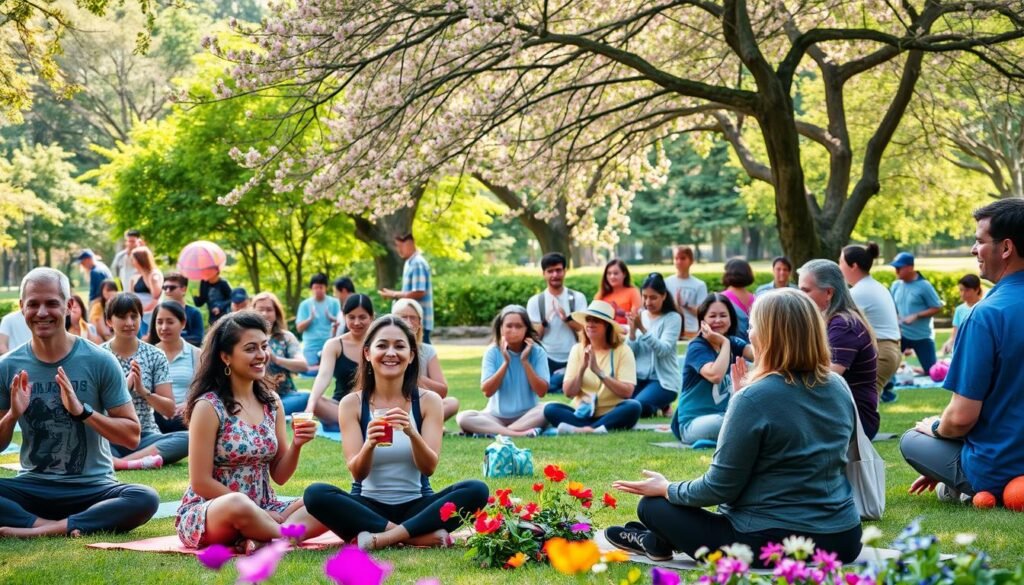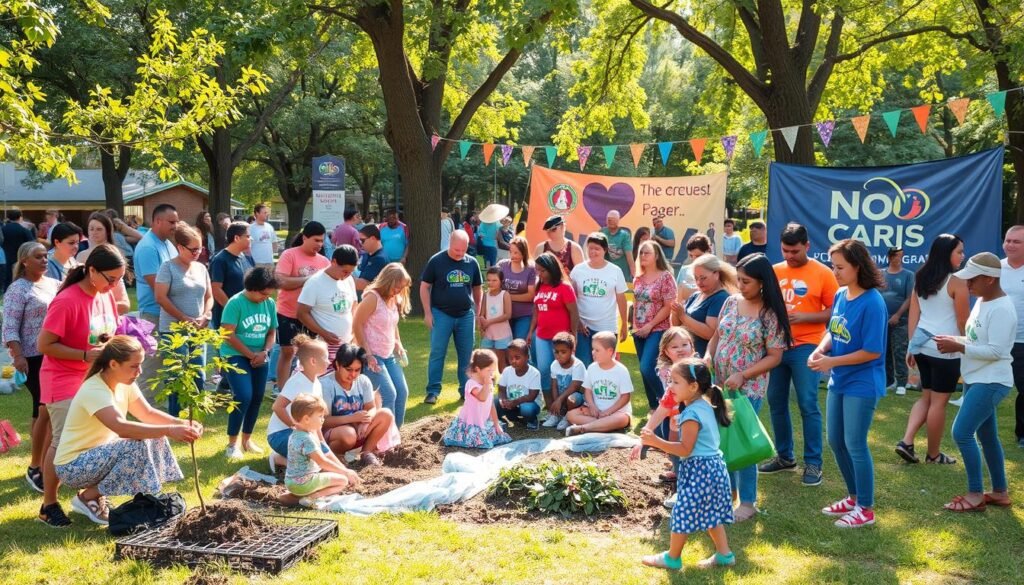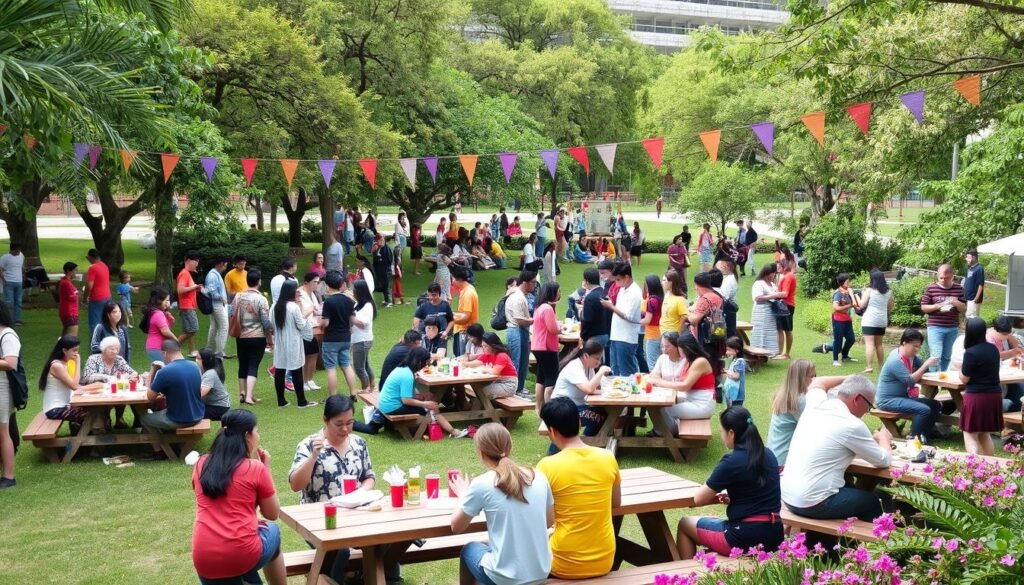Did you know not talking to people can be as bad as smoking 15 cigarettes a day? This fact shows how important social connections and support systems are. They help fight anxiety and keep us well. In places where seniors live, creating these bonds often starts with community events. These events are not just fun but also help people make meaningful friendships.
These gatherings let people share stories, enjoy company, and find friends, which is key for those with anxiety. Feeling alone can lead to sadness and less sharp minds. Being part of a group that supports you is very important. Such communities and mixing with different ages can make you healthier in mind, body, and spirit. By making these friendships, older adults feel important again. This helps them not to feel lonely.
As this article shows, community events are very important. They help reduce anxiety and make life better for older adults. Read more about how better social lives can create happier and more active communities for everyone at ONELIFE Senior Living.
Key Takeaways
- Strong social connections help reduce anxiety and promote mental well-being.
- Community events create opportunities for meaningful interactions among individuals.
- Supportive relationships can enhance emotional and physical health, especially in seniors.
- Fostering community engagement is crucial to combat the risks associated with social isolation.
- Interpersonal relationships provide a sense of belonging and purpose in life.
The Importance of Social Connections for Mental Health
Social connections are key to mental health. They help us feel like we belong. Friendships, family ties, and bonds at work or in the community are important. People with strong relationships often have better mental health. This is because they get emotional support when times are tough.
Defining Social Connections
Social connections include all kinds of relationships we have. They can be deep or casual but all are important. Strong social ties can make us happier and less likely to be sad or anxious. By interacting with others, we build resilience. This helps us handle stress better and find meaning in life.
The Role of Support Systems in Well-being
Having people to support us is vital for our mental health. With this support, we’re less likely to feel depressed or anxious. Without it, our health can suffer. This might even increase our chance of depression. But, a strong network boosts our self-esteem and ability to deal with stress. These relationships help us live happier lives.
The Human Need for Interpersonal Relationships
Our society is built on human connection. We all need interpersonal relationships to thrive. From being little kids, we count on others for emotional backing and steadiness. This remains true as we get older, impacting our mental health and happiness.
Understanding Human Connection
Studies highlight how empathy in interpersonal relationships leads to kindness and teamwork. These ties offer many health perks. They fight loneliness and cut down stress. Strong relationships even help us live healthier, pushing us towards good diet and exercise.
The Evolution of Social Interaction
The importance of social interaction has changed over time. Having friends can make us happy, but there can be hard times too. It’s natural to feel a mix of emotions when friendships change. Learning to bounce back helps us see relationships in a positive light. It motivates us to make new friends.
| Benefits of Interpersonal Relationships | Physical Health Impact | Mental Health Impact |
|---|---|---|
| Combating loneliness | Lower risk of cardiovascular disease | Decreased risk of depression and anxiety |
| Increased resilience to stress | Improved longevity | Greater emotional support |
| Encouraging healthy behaviors | Enhanced heart and kidney function | Higher levels of optimism and life satisfaction |
| Stronger social networks | Lower blood pressure | Reduced reports of physical ailments |
Community Events as Catalysts for Connection
Community events are key in building social connections. They make people feel part of a community, helping with mental health. They offer great chances for connecting and can reduce loneliness. Being part of events builds support needed to tackle life’s ups and downs.
Types of Community Events
There are many kinds of community events for different interests. Examples include:
- Festivals and fairs
- Workshops and educational seminars
- Volunteer initiatives
- Support groups and health fairs
- Networking events for local businesses
- Outdoor activities like group hikes or yoga sessions
How Events Foster Engagement and Belonging
Joining community events helps people dive into social settings. This increases a sense of belonging and builds stronger community bonds. These bonds are important in fighting loneliness.
About 25% of older adults in the US feel socially isolated. At events, they can form friendships that boost their mental strength.
Community events offer a way to connect and grow both personally and professionally. They are comforting for those with anxiety, offering familiar faces. They bring people together around common interests, improving personal skills and the community’s health. You can learn more about the importance of these events in this resource.
Community events play a crucial role in fighting loneliness and improving mental health. They allow personal development and make sure everyone can join in. With so many events, there’s something for everyone to connect and grow their social circles.
Social Connections and Support Systems: Key to Reducing Anxiety
Research shows how important our friends and family are for our mental health. Many studies link social support to feeling less anxious. People with strong support systems handle stress better and feel less worried. This tells us we need to keep our relationships strong for our mental health.
Research Findings Linking Social Support and Anxiety Relief
The APA’s Stress in America survey in 2024 found a lot of stress comes from national issues. Seventy-seven percent of participants were stressed about the country’s problems. Seventy-three percent were worried about the economy. Sixty-nine percent were anxious about the presidential election. This shows we need our friends and family more during tough times. A study in 2022 found that support from others makes us more resilient. It helps us deal with stress better. Also, having good friends can make our bodies handle stress better, leading to better health.
The Protective Role of Meaningful Interactions
Talking and connecting with others protects us from feeling too anxious. Having supportive people around makes us feel valued. This boosts our self-esteem. Studies show feeling very lonely can hurt our physical health and make our relationships less fulfilling. But, strong connections help us deal with problems better. Thanks to good friends and family, we can face life’s challenges easier. This support can even help us live longer and healthier lives. For more tips on how to live a life that keeps anxiety away, visit this resource.

Benefits of Building Diverse Social Networks
Building diverse social networks helps those seeking mental health support in many ways. Different relationships bring unique viewpoints and strengths. This mix is key for resilience and finding ways to handle mental health challenges.
Why Diversity in Connections Matters
Having a diverse social network boosts overall well-being. It exposes one to a wide range of thoughts and life experiences. Thanks to 3.2 billion social media users worldwide, it’s easy to meet different people. Contacts from varied backgrounds can improve how we make decisions and ensure fairness, particularly at work. For instance, women with strong networks often reach higher in their careers.
Coping with Mental Health Challenges through Networking
Networking is vital in handling mental health issues. It provides a shield against stress and lifts our spirits. Studies show people with diverse friendships face mental health problems better. They enjoy a higher quality of life too. By playing different social roles, folks find coping methods that suit their specific needs. Whether it’s through Employee Resource Groups or personal ties, varied networks offer a solid support system.
Volunteering Initiatives and Their Impact on Mental Wellness
Volunteering creates a support system that significantly boosts mental health. It lets people form important bonds, increasing emotional strength. These actions help the community and grow personal wellbeing, cutting down on stress.
How Civic Engagement Boosts Emotional Resilience
Being active in the community gives people a strong sense of purpose. This lowers stress and depression. For example, volunteers often feel better about themselves and are happier.
Joining others in support work shifts focus from one’s own problems, fostering a supportive relationship network. This network is key in overcoming life’s hard times, making volunteers mentally stronger.
The Link Between Volunteering and Reduced Anxiety
Studies show volunteering links to better mental health. Volunteers, especially older ones, feel less lonely.
Being part of a community lessens depression and anxiety signs, improving mood. Also, volunteering broadens social circles. These networks help deal with mental health issues.
| Study Findings | Impact on Mental Health |
|---|---|
| Volunteering boosts emotional resilience | Lower levels of stress and depression |
| Connections made through volunteering | Decreased loneliness and improved mental health |
| Volunteer work fosters community networks | Effective coping mechanisms for life challenges |
| Engagement in civic activities | Higher self-esteem and happiness |
| Volunteering linked to reduced anxiety symptoms | Enhanced overall mood and emotional well-being |

Challenges in Creating and Maintaining Social Connections
It’s not easy to create and keep social connections. People often face social isolation and loneliness. These issues can hurt our mental health. It’s very important to deal with these matters, especially when life is so busy. Often, we forget how crucial personal relationships are.
Addressing Social Isolation and Loneliness
Social isolation affects our well-being a lot. People of all ages face different challenges in making friends. Teenagers are figuring out who they are. Young adults value friendships and romantic partners. Middle-aged people juggle family and work relationships. Seniors rely on friends for emotional support and help.
Research shows social isolation is as bad for health as smoking. Having meaningful relationships helps us feel emotionally strong and live healthier.
The Impact of Technology on Social Connections
Technology helps and hinders our relationships. It can connect us across long distances. Online, we can meet people who share our interests. This can lead to new friendships.
But too much screen time can lessen face-to-face talks, which can harm relationship quality. Real-life talks have emotional cues that digital chats lack. Finding a good mix of technology and personal time is key to true friendship.
| Aspect | Positive Impact | Negative Impact |
|---|---|---|
| Social Media | Bridges geographical barriers, connects like-minded individuals | May lead to decreased face-to-face engagement, emotional depth |
| Loneliness | Promotes awareness of need for support | Increases risk of mental health issues, similar to health impacts of smoking |
| Technology Use | Offers tools for maintaining connections | Over-reliance can exacerbate social isolation |
| Interpersonal Skills | Enhances opportunities for engagement through various platforms | May weaken through reduced practice in real-life settings |
Effective Strategies for Building Social Connections
Building strong relationships needs both effort and purpose. If you’re looking to make your social life richer, dive into local gatherings and events. These places are perfect for meeting others who like what you like and value what you value.
Participating in Local Activities and Events
Getting involved in community affairs, like fairs, workshops, or sports, can be very welcoming for making new friends. These events attract a mix of people, which makes forming friendships easier. You can also join clubs, take classes, or do volunteer work to meet more people and grow your circle of friends. The CDC says making such connections can help you avoid feeling lonely or depressed, especially for young folks and seniors.
Utilizing Online Platforms for Community Engagement
In our digital world, online spaces are key to building community ties. Through social media, forums, and online events, you can connect with others who share your interests, no matter where they are. Being active in online local communities can lead to meaningful relationships even without meeting in person. Creating supportive online spaces helps people work together, share ideas, and make lasting connections. This is great for everyone’s well-being.

Embracing Technology to Foster Connections
Technology is a key player in today’s world for keeping us connected. It’s really important now, as we deal with loneliness and being apart from each other. While being online helps us stay in touch, it’s not all perfect for our mental health.
The Benefits and Drawbacks of Virtual Interactions
For many, especially older people, chatting online cuts down on feeling lonely. Tools like video calls and social media bring us closer, keeping friendships alive. These online spaces boost confidence and help people feel more connected.
But, spending too much time online has its downsides. It might make us feel not good enough or that our friendships lack depth. Knowing how to mix online chats with real-life talks is key for real friendships.
Mindful Technology Use for Enhanced Relationships
Being smart about how we use technology is important for good friendships. Limiting how much time we spend on social media, choosing real conversations over texts, and being thoughtful online makes our connections stronger. By aiming for deeper ties, we not only make our friendships better but also our mental health.
Using technology wisely can really make our social lives better, fighting off loneliness. It’s about finding the right balance.
| Aspect | Benefits | Drawbacks |
|---|---|---|
| Social Connections | Helps maintain relationships over distances | Can feel shallow or less fulfilling |
| Impact on Loneliness | Reduces feelings of isolation | Excessive use can increase isolation |
| Emotional Resilience | Offers support during difficult times | Over-dependence may lead to emotional burnout |
| Communication | Faster and more accessible interactions | Lack of non-verbal cues may lead to misunderstandings |
Conclusion
Community events are key for fighting anxiety and boosting mental health. These events help people make friends who support their emotional health. This makes them happier and more mentally strong.
Studies show that having social support improves mental health. It helps reduce depression and anxiety. Social connections offer emotional and practical help, especially in tough times. Joining community events improves many parts of life, highlighting the need for spaces where people can connect.
Strong social bonds are vital for good health. Local events build these bonds, helping people find relief from anxiety and better mental health. Getting involved in the community is a great way for improving life quality. For more information, check out this detailed study.